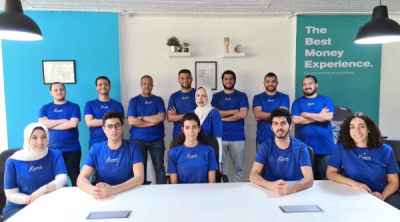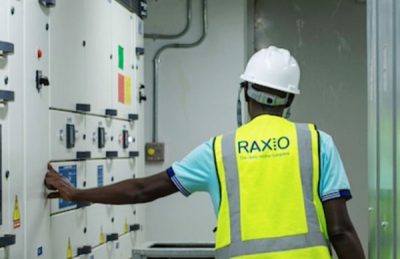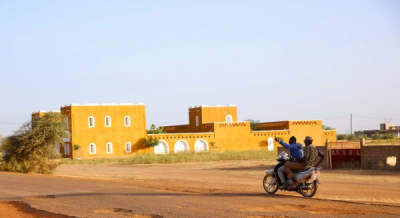Morocco is currently developing its human capital to become a global tech hub. To do so, it is partnering with various actors.
The Moroccan Ministry of Industry announced, Tuesday (November 2), two memorandums of understanding with international consulting agency Capgemini.
The memoranda aim to create the conditions required to train tech talents and develop the local engineering talent to make the country a leading destination for tech investments.
In a press statement, the government explained that the MoUs would help create 1,500 additional highly skilled jobs in the engineering sector by 2026. The “investment embodies the growing confidence in Moroccan skills and confirms the attractiveness of the Kingdom as a technological and engineering destination of choice for outsourcing,” added Minister of Industry Ryad Mezzour (photo, left).
According to a study financed by the European Bank for Reconstruction and Development (EBRD), Morocco is faced, for years now, with a shortage of engineers and technicians. To address the issue, the government has inked partnerships with several international companies to develop diversified skills and competencies in a range of innovative sectors. In April, the country signed four more MoUs for investment projects that are expected to create over 5, 000 jobs in the outsourcing sector.
CapGemini launched its Moroccan subsidiary in 2007. Since then, it has become the largest tech company in the country. According to Idriss Elasri (photo, right), Managing Director of Capgemini Engineering Morocco, the company hired 800 new staff in 2021 and 1,100 in 2022.
Samira Njoya
Over his decades in the international business world, he has launched many ventures but, through DizzitUp, the most recent one, he wants to leave a strong social impact on the African population.
Solofo Rafenombolatiana (photo) is a Malagasy telecom engineer and entrepreneur. He is also the co-founder and CEO of DizzitUp, a startup founded in 2018, in Togo.
The said startup offers an international marketplace through which Africans, wherever they are, can finance, sell and buy essential renewable energy, food, health, education, tech, and financial products and services anywhere on the continent.
The marketplace was initially built to facilitate access to energy and financial services. In 2021, during an interview with French media Paris Singularity, its CEO explained that the idea germinated in mid-2017, when he noticed that Mada, a small village where he has been a teacher, still had no access to electricity thirty years after he left.
For the businessman, now in his fifties, poor access to energy and financial services is hampering development in Africa. So, apart from its energy-as-a-service business, DizzitUp also developed a decentralized and secure digital infrastructure based on blockchain and stablecoin for instant transfers and payments. The infrastructure allows users to pay or send funds anywhere in the world without being burdened by any constraints.
On October 28, 2022, Solofo Rafenombolatiana was honored, in Lome, Togo, for DizzitUp, which was among the six finalists of the fifth Ecobank Fintech Challenge. Nevertheless, DizzitUp is just one of the many ventures launched by the serial entrepreneur.
In 2000, in Paris, he founded Mobiligense SA, a SaaS mobile value-added services editor and operator. Eight years later, he launched Beezbox SAS, a Paris-based social customer relationship management service provider. In 2014, he also founded Sunny Live Music, a jazz concerts and festivals organizer.
He started his international professional career in 1986, working as a sales support engineer for Wang France. Two years later, he joined Hewlett-Packard as a sales and marketing manager.
After a stint, between 1997 and 2000, as the vice president and general manager at Bull Information Systems, he founded his first company. Concurrently, from 2003 to 2004, he was the vice president and director of Technicolor’s (formerly knowns as Thomson) mobility business unit. Between 2011 and 2013, he was the marketing and digital media director of AFM-Telethon, a French non-profit organization against muscular dystrophy.
Melchior Koba
Fintech is currently the most dynamic segment of the African tech ecosystem. It attracts a significant portion of financings and aims to foster financial inclusion on the continent.
Kiwe is a fintech solution developed by an Egyptian eponymous startup. It allows its users to transfer money in real-time, and quickly pay SMEs. It also helps event managers collect payments.
"We are strong believers in empowering freelancers and business owners by helping them identify their targets, level up their customer experience, and accept online and offline payments. Our vision is for KIWE to become a verb interchangeable with any word that speaks of payments. We strive to have our customers reach out to their phones instinctively whenever a receipt is printed, a cheque arrives at the table, or a friend’s pay-back is due," Kiwe explained in a release in 2021.
To fulfill its set mission, the startup developed a mobile app, accessible for Android and iOS devices. Once downloaded, the app allows users to register their accounts to start making transactions. In addition to the features mentioned above, the app also allows one-scan transactions, positioning itself as a pretty handy tool for making any type of payment. On PlayStore, it has already been downloaded more than 5,000 times.
Last month, it raised an undisclosed amount from vaIU, a subsidiary of universal bank EFG Herme Holding. "With its unique offering and simplified, engaging user experience, Kiwe will benefit greatly from leveraging our vast and ever-growing network of vendors. Hence, this is an investment that promises growth for all," said Habiba Naguib, Head of Strategy and Market expansion at valU.
Adoni Conrad Quenum
According to the report "Data Center Market in Africa - Industry Outlook and Forecast 2020-2025" (ReportLinker), the African data center market is expected to grow at a 12% annual rate and reach US$3 billion in 2020-2025.
Pan-African data center operator Raxio Group announced, Monday (October 31), the launch of construction works for its first data center in Grand-Bassam, 30 km from downtown Abidjan, Côte d'Ivoire. The foundation stone of that infrastructure will be laid tomorrow, November 3, we learn.
"Our primary mission is to help lay the foundations of the African digital economy with groundbreaking technologies aimed at ensuring the performance, security and service levels required to meet information systems’ security needs,” it explains.
Raxio group unveiled its plan to build a data center in Côte d’Ivoire, in October 2021. The plan was in line with the continental expansion plan it launched, in 2019, to meet the African growing demand with ten to twelve more data centers. In the framework of that expansion plan, it currently operates a 1.5MW facility in Kinshasa, while others are under construction in Ethiopia, Tanzania, and Uganda.
According to the group, Côte d'Ivoire is the fastest growing economy in Francophone West Africa. This is notably why it chose it to host its first Tier 3 data center in the region so that it “will serve customers in Abidjan and the wider UEMOA region at a time when digital transformation, data and content consumption, and connectivity are all increasing at historic rates.”
The data center, scheduled to be operational by Q3-2023, will be headquartered at the ICT and biotech park VITIB, in Grand-Bassam. According to the company, Raxio Côte d'Ivoire will offer “customers an optimized environment for their IT equipment in a state of the art, modular facility, fully equipped with industry best in technology, security, AC/DC power compatibility and redundancy.”
Samira Njoya
In recent years, Africa’s booming tech ecosystem has attracted several investors. This dynamic environment encourages the development of various tech solutions to address local issues.
Nawali is a real estate platform developed by a Senegalese start-up, founded, in 2018. It allows the African diaspora to easily acquire real estate properties (from lands to turkey houses) in countries where it is currently active: Senegal, Mauritania, Gambia, Mali, and Côte d’Ivoire namely.
The platform functions like a marketplace where real estate properties are listed, allowing users to acquire any property they are attracted to.
The startup has developed several funding mechanisms allowing buyers to either pay in cash, by installments, or by joining Nawali tontine (a mutual savings scheme that allows users to save collectively and purchase properties at the end of the savings period when they collect the amount saved.)
Nawali also offers its buyers eco-friendly houses made of raw earth bricks. It recently launched a project aimed at building an eco-city in Southern Cameroon. In July 2022, the startup opened a funding round to raise €460,000 to support the project. According to its founder, Aïta Magassa, apart from helping create massive jobs for qualified workers, the project, which is “perfectly adapted to the needs in Africa,” would allow the African diaspora to reclaim its lands.
Adoni Conrad Quenum
By digitizing the pharmaceutical industry, the serial entrepreneur and angel investor wants to facilitate access to health products, therefore contributing to development goals. Over the past five years, his actions have earned him the trust of several investors.
Bryan Mezue (photo) is a Nigerian entrepreneur and investor. He is the co-founder, president, and CEO of Lifestores Healthcare, a healthtech startup that aims to improve access to quality health products and streamline pharmacy management.
With PharmaIQ solution, his startup offers two main services that effectively fulfill its core ambitions. The first service is OGApharmacy, an online B2B pharmaceutical marketplace that lets hospitals and pharmacies source authentic and affordable healthcare products. It combines the supply needs of hundreds of healthcare providers and negotiates with manufacturers and importers on their behalf.
The second solution is an ERP package specifically designed for Nigerian pharmacies. It takes care of the key aspects of pharmacy management, including sales, inventory, acquisition, and expiry notifications.
Bryan co-founded Lifestores Healthcare, in 2017, with Andrew Garza as its chief operating officer. About five years on, on October 4, 2022, he announced the close of a US$3 million pre-Series A round to continue to democratize “access to quality and affordable primary healthcare in sub-Saharan Africa.”
In 2016, he had already founded Banyi Group, an advisory and investment holding group. In 2018, he was one of the members of the inaugural Obama Foundation Leaders program. Some five years earlier he co-founded West Africa Vocational Education (WAVE) Academy, an academy supporting skill development for increased income.
The serial entrepreneur started his professional career, in 2006, as an investment banking summer intern at Barclays Capital. He later joined the London-based consulting firm Bain & Company as a consultant. Between May and October 2011, he was the Director of Operations and Business Development at d.light Design, a renewable energy semiconductor manufacturing company. The following year, he was hired into MyTime's operations, sales, and marketing department. The same year, he completed a professional internship at Actis as a private equity associate before becoming the manager of the management consulting firm Bain & Company.
Melchior Koba
The new director general was appointed to save the public postal company from its various woes.
Senegal’s public postal company “La Poste” will undergo an extensive digital transformation in the coming months, new director Mohamadou Diaïté indicates.
According to the director general, who assumed office last Monday, digital transformation is one of the priorities of the "Strategic Plan for the Expansion of the Post (PSE-P)." The said plan includes actions like the modernization of the company’s logistics, the development of electronic banking and e-commerce, and the addition of innovative financial services.
"It is not conceivable that in 2022 we will still be issuing manual receipts. We need to diversify our products and make up for our lateness to ensure improved profitability,” he said.
In recent years, the national postal company has faced several issues affecting its operations. The issues include low-tech tools integration and poor management of customers’ new ICT needs.
To address the various issues identified, in 2021, the posts and telecommunication regulator ARPT organized a workshop for the development of a new strategy that would modernize the postal sector. The strategy focuses on four areas, including the promotion and use of ICTs to improve the overall performance of the sector.
Mohamadou Diaïté wants to ensure the continuity of the actions suggested. He plans to address the issues by "judiciously exploiting the objective and scalable opportunities presented by the" national postal company. For that purpose, an institutional transformation is needed to create a postal bank, he explained. He added that there is a need to accelerate digital transformation, diversify products and services to cover a broader range and introduce more innovation by strengthening and modernizing logistics, electronic banking, and e-commerce
Samira Njoya
According to the Organization of the Petroleum Exporting Countries (OPEC), global oil demand would grow continually till 2035, driven by developing countries in Africa, India, and Asia. To capture part of that demand and attract investors to its energy sector, Algeria has multiplied initiatives in recent years.
The Algerian Agency for the Valorization of Hydrocarbons Resources (Alnaft) announced, Sunday, the launch of EXALT (EXplore Algeria Today), a digital platform that provides information on the country’s mineral and sustainable resources.
According to Alnaft chairman Nour Eddine Daoudi, the platform is "an unprecedented opportunity in the history of the Algerian energy market.”
“It will allow investors to check new deposits, peruse and assess the national hydrocarbon potential,” he added.
The "fully integrated" tool, developed by international oilfield services provider Schlumberger (SLB), will help demonstrate the value of domestic upstream opportunities. It will also help promote Algeria's hydrocarbon resources thanks notably to future tenders. For Nour Eddine Daoudi, it can be accessed by everyone, everywhere in the world.
Algeria is a notable oil exporter with one of the largest oil and gas reserves in the world. In its World Economic Outlook, published last October 11, the IMF estimates that the country’s economy would grow by 4.7% in 2022, thanks in particular to an increase in its oil export revenues.
Samira Njoya
Computers and smartphones are undoubtedly useful in our daily lives. However, their excessive use can have negative impacts on users’ physical and mental health. It can also negatively affect children’s psychosocial development. To prevent those consequences, Gabon is implementing awareness-raising actions.
Gabon will launch a national digital awareness campaign in the coming months. In a prelude to that campaign, last Friday, it organized a conference under the theme: "The dangers of overexposure to screens: impacts on behavior and health." The national campaign, initiated by consulting agency Blanc Cristal and the rehabilitation center Mot à Mot, is organized thanks to the Ministry of Digital Economy’s support.
According to Virginie Mounanga, CEO of Blanc Cristal, it aims to alert parents on the dangers of overexposure to the Internet and screens. "We have met with several doctors, specialists, and school principals who complain about children and adolescents being addicted to the Internet, cutting themselves off social activities [...] and affecting school performance. So, we need to alert parents and educators of the dangers, allowing them to mitigate those impacts,” she explained.
Gabon, like many African countries, adopted digital technologies to keep socio-economic activities going during the coronavirus pandemic. The pandemic changed internet consumption habits, boosting demand for connectivity. Consequently, the average time spent in front of screens has risen sharply. This caused several health (myopia, sedentarization), behavioral (sleep and mood disorders), and social (language delays, attention disorders, and school difficulties) problems.
According to the professionals who took part in the conference, some measures need to be taken to address the problems. They include limiting internet time, turning off Wi-Fi intermittently, and developing social and family activities.
They also mentioned the Canadian method of limiting screen time for children. According to the specialists, it involves forbidding screens to children before the age of 2 and monitoring usage time for those older than 2.
Samira Njoya
The African digital economy is a promising sector that is expected to be worth US$712 billion by 2050, or 8.5% of continental GDP. To capitalize on its dividends, several countries are implementing digital transformation strategies. Some of them, including Côte d’Ivoire, have accelerated their plans, after the coronavirus pandemic.
Côte d’Ivoire needs more than XOF2 trillion (US$3 billion) to complete its digital infrastructure program, Digital Minister Amadou Coulibaly indicated last Friday. The official presented the estimate during a plenary session around the theme "Investing in Côte d'Ivoire", at the 10th edition of the CGECI Academy organized by the General Confederation of Enterprises of Côte d'Ivoire (CGECI) - Patronat Ivoirien.
The program includes the construction of the National Data Center and the completion of the national backbone. The two projects, slated for completion in 2025, will complement the others planned under the national digital development strategy and support economic development.
The data center will bring together, in one secure location, all the public services that the government is currently dematerializing, therefore ensuring their efficiency. As for the national backbone, it will help provide cheaper broadband -an essential requirement for enhancing access to dematerialized services and socio-economic opportunities- to every household.
According to Minister Amadou Coulibaly, a National Digitalization Committee will be set up to coordinate digital development activities. He added that the Prime Minister would launch the committee’s activities in the coming months.
The projects mentioned are part of the 2025 digital strategy developed under the Ministry of Digital Economy’s lead and adopted during the December 22, 2021, Ministerial council. The strategy suggested 32 reforms and 96 projects to be implemented over the 2021-2025 period. Its indicative budget is XOF2 trillion.
According to the World Bank, Côte d’Ivoire could generate over US$5.5 billion and US$20 billion from the digital economy respectively by 2025 and 2050 if the strategy is effectively implemented.
Samira Njoya
More...
In Africa, hospitals are still recording numerous deaths caused by the shortage of blood products. To solve this problem in his country, a Sierra Leonean tech entrepreneur has set up an e-health solution facilitating blood donation.
LifeBlood is a digital platform developed by a Sierra Leonean eponymous startup. It allows users to donate blood in a few clicks.
With its mobile app "Donate Blood," it streamlines the blood donation process. Once a user downloads the app and registers an account, he/she can carry out a blood test and, if everything goes well, donate blood and set a donation frequency. The app reminds its users of upcoming donations.
The Sierra Leonean startup has numerous blood donation centers, across the country. Its centers are usually set up in hospitals, giving users the choice to get to the centers closer to their homes or offices depending on their schedules. This approach helps users donate blood without causing much disruption to their tight schedules.
It also allows users to set up blood donation campaigns, and define the targets, periods, etc. With this feature, it aims to allow users to support its actions, therefore increasing the number of unpaid voluntary donors and improving the operational efficiency of blood services and the national blood safety service.
For its actions, the startup won the first prize of the Orange Social Venture Prize in Africa and the Middle East (POESAM), going home with a €25,000 check.
Adoni Conrad Quenum
In Nigeria, she is one of the pioneers of extended, augmented, and virtual reality. She sees those tech tools as interesting opportunities to offer innovative solutions to the population.
Judith Okonkwo (photo) is a Nigerian business psychologist and the founder of Imisi 3D, an extended reality creation lab based in Lagos, Nigeria.
Through the creation lab, launched in 2016, Judith nurtures an African community of augmented and virtual reality content creators. She also creates virtual and augmented reality solutions and provides “educational and engagement experiences with AR/VR.” She aims to “change the technology narrative so that [Africans] become creators and not just consumers of technology.”
In line with that mission, she recently partnered with Meta and Black Rhino VR to launch the Sub-Saharan Africa and North Africa AR/VR metathon, on October 24. Through this event, one of the first of its kind in Africa, the young woman wants to find and support African innovative augmented, extended and virtual reality solution creators.
The business psychologist places high hopes in the metathon, slated for mid-August 2022- April 2023. Imisi 3D “is our biggest and most ambitious event yet, providing even greater access for XR. […] This year’s AR/VR Africa Metathon brings together our AR/VR Africa pre-hackathon training, hackathon, and Bootcamp in one program,” Judith Okonkwo explains.
Since August 2022, she is a visiting global scholar at Harvard University. From 2017 to date, she has led AR/VR Africa, an African community of augmented, virtual, and mixed reality creators and enthusiasts that she founded. From 2016 to date, she is also a member of the World Economic Forum Global Future Council on VR/AR. She is also a co-founder of We Will Lead Africa, a global network that creates platforms to share experiences and inspire leadership in Africa.
Since 2013, Judith Okonkwo is the Director of the European Organisation Design Forum. She is also a visiting lecturer and researcher at the Centre for Business Psychology at the University of Westminster, since 2005. In 2008, she founded the leadership development center Oriki Leadership Coaching and co-founded the international facilitation and consulting firm Tomorrow by Design in 2014.
Her professional career began in 2000, as a press release and recruitment officer for the 31st Nigerian Artillery Brigade. In 2001, she was recruited to the Human Resources Department of the United Bank for Africa (UBA) before joining Insights Learning and Development in 2007 as a corporate psychologist. She later worked for British Airways (2011 to 2016) as an organizational intelligence consultant. While still working for British Airways, in 2014, she joined the global placement network Andela as Director of People and Professional Development.
Melchior Koba
The center is launched in response to Tunisian companies’ IT security needs. The project is technically and financially supported by the United States.
The Tunis Higher Institute of Technological Studies (ISET'COM) inaugurated a cybersecurity center of excellence last Tuesday, October 25.
The center aims to train and develop the cybersecurity of various stakeholders, including students, professors, researchers, and professionals. It was launched thanks to the technical and financial support of the U.S. Embassy in Tunisia. "It will facilitate the development of academic and professional training programs targeting the public and private sectors’ cybersecurity needs, per its overseeing institution’s skills development and reskilling strategy," explained Kamel Saadaoui, the Tunisian Ministry of ICT’s Chief of Staff.
The center is in line with Tunisia’s ambition to train cybersecurity specialists to meet companies’ needs. It was specifically set up to meet that need and serve companies in various sectors, including tech and telecom firms. The center will also conduct accreditation and certification programs.
Vanessa Ngono Atangana
He launched his fintech startup after a rich professional experience accumulated while working for national and international firms. His ambition, through the startup, is to streamline payments in Africa.
Nader Abdelrazik (photo) is the co-founder and CEO of MoneyHash, a fintech startup founded in 2020. With MoneyHash, he built an API that allows large organizations operating in the Middle East and Africa (MEA) to collect payments.
He explains that “MoneyHash’s main goal is to give businesses in the region the ability to upgrade their tech especially regarding such a sensitive piece: payments.”
“We aim to be the leader when it comes to building and maintaining a payment infrastructure, and to do so, our impact has to be empowerment and growth of companies that use us,” he adds.
In February 2022, Moneyhash secured US$3 million in pre-seed financing, to expand in Sub-Saharan Africa. On October 20, 2022, it announced the launch of its digital solutions in new markets, including Nigeria, Kenya, and South Africa.
Nader Abdelrazik, who nurtures great ambitions for the fintech startup, wants to support that growth plan by contributing his rich professional experience, which started back in 2008. That year, he was a summer trainee in the quality department of the pharmaceutical technology company GlaxoSmithKline. Two years later, he joined Siemens as a trainee business developer before being hired, in 2011, as an entrepreneurship head coordinator by the Egyptian non-profit organization INJAZ Egypt.
From 2012 to 2014, he was a research assistant at the Nile University and a strategy project manager for Meshka Co-Learning Space, from 2014 to 2015. In 2016, he worked as a business designer for Conservation International Suriname and the global expansion consultant for Kiron Open Higher Education. Then, the following year, he taught systems thinking at the University of Berkeley.
He later became a diversity and inclusion consultant for Microsoft before joining Think.iT as the head of product innovation. From 2018 to 2019, he worked as a strategy lead hardware builder Elkrem. He then became the interim executive director of the Global Fellow Network of the American Middle East Network for Dialogue at Stanford (AMENDS) from August to November 2019.
He also worked as a business manager for fintech startup Xpay, until 2020, before getting recruited as a business design consultant, by Kiron Open Higher Education.
Melchior Koba















